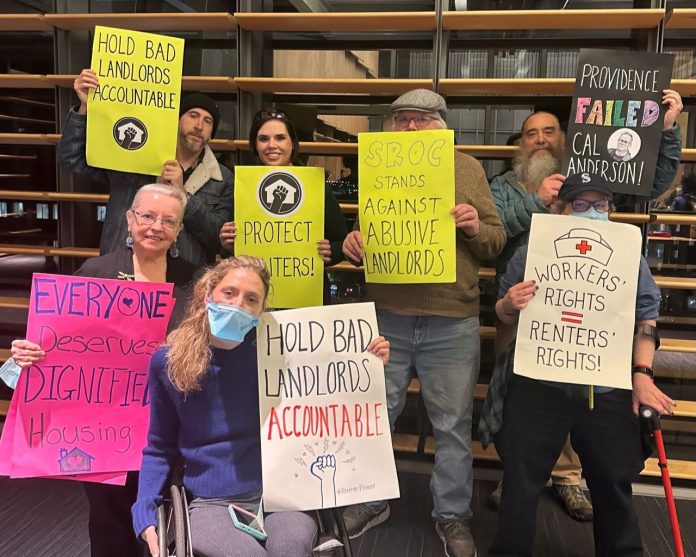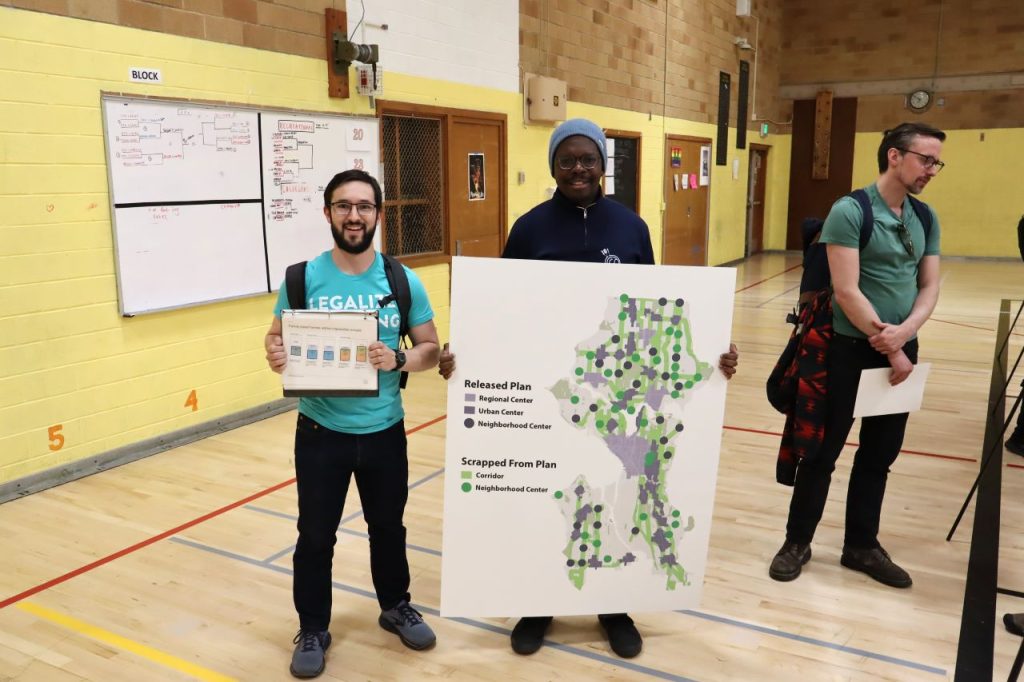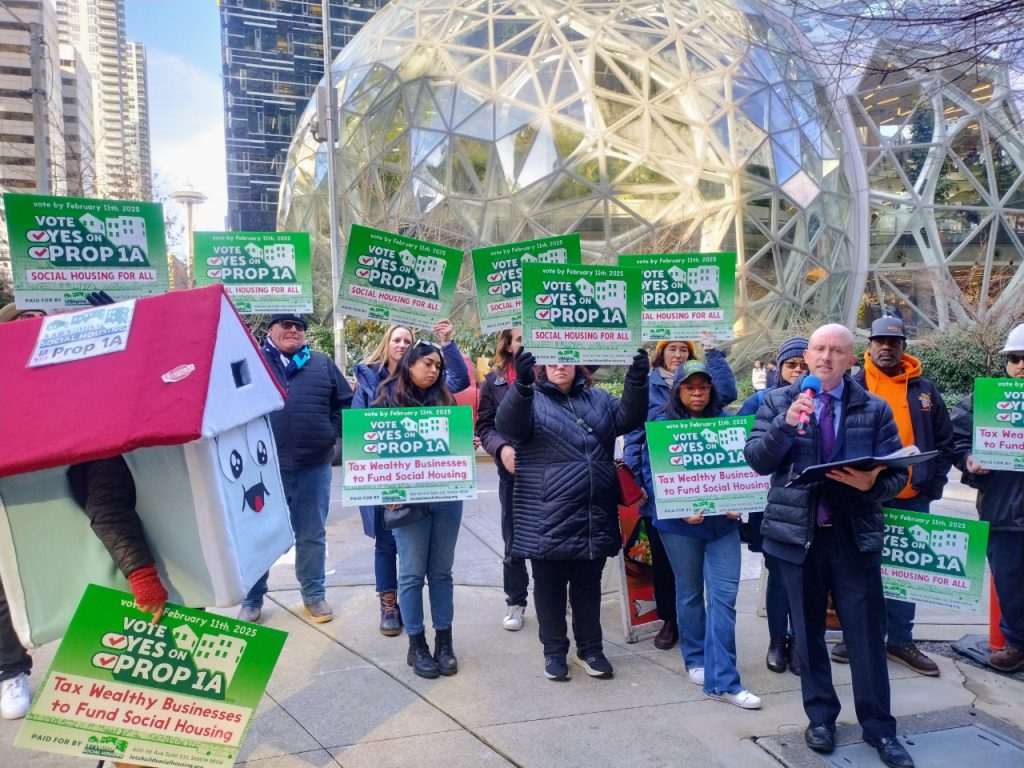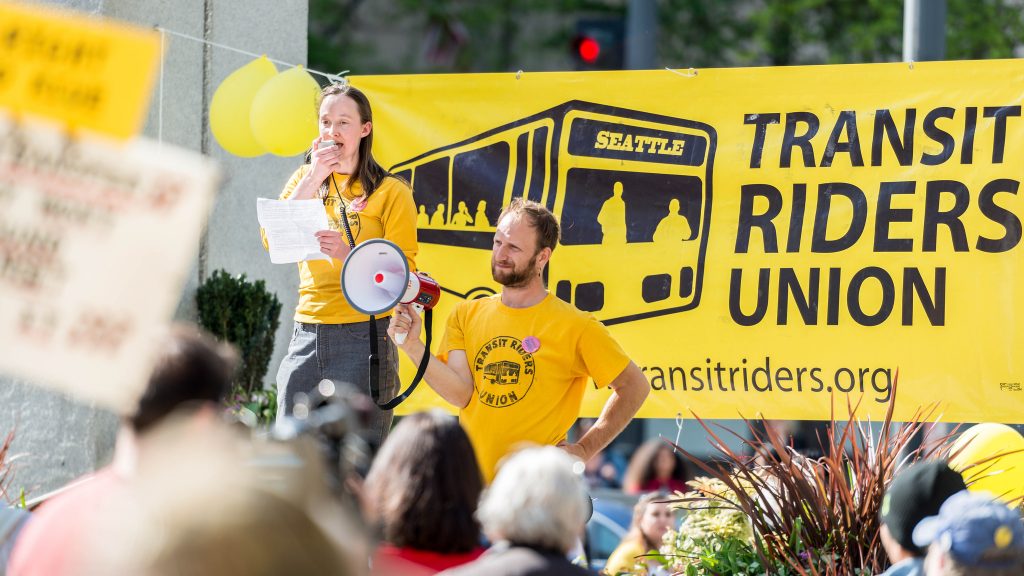
It’s Affordable Housing Week in King County. Here are five things the City of Seattle could be doing to lower your rent.
Renters have a big victory to celebrate this Affordable Housing Week: the passage of a statewide anti-rent-gouging law. Henceforth, landlords will not be allowed to raise rents more than 7% plus inflation, up to a maximum of 10% annually. (New construction is exempted for the first 12 years.)
Over the past five years, as I’ve been organizing to strengthen renter protections and raise minimum wages across King County, I’ve talked with plenty of people who arrived home to find notice of a 20%, 30%, or even 40% rent increase taped to their doors. That kind of rent hike is tantamount to economic eviction, and the new law will provide an important protection.
At the same time, the law is not as strong as advocates hoped for. A 10% rent increase on a $2,000 apartment is still $200 a month — no small amount.
Luckily, there’s a lot Seattle can do to go further, tackling the problem of sky-high rents at multiple points — root, trunk, and branches. With city leadership willing to step up to the plate, here are five things we could do:
1. Zone for Abundant Housing
The affordable housing shortage tilts the playing field in favor of landlords, because where are you going to go? In a tight rental market, your landlord has a mini-monopoly over your housing options. They can jack up the rent and you’ll most likely stay put until you really, truly can’t pay.

Conversely, ample housing gives renters more bargaining power. Back in that extraordinary first year of the pandemic, there was a moment when vacancy rates were high and rents slackened. I was able to go to my landlord and say “Hey, we’re looking at a very similar apartment in Lower Queen Anne that’s a lot less expensive. We’d prefer to stay here, but…” The landlord agreed to bump our rent back down to what it had been a couple years earlier when we moved in.
While zoning for more housing won’t automatically make rents affordable for the lowest-income residents — we need other strategies for that — for those of us spending far too much of our income on market rate rents, it really does make a difference. And on this front, we can do a lot better than Mayor Bruce Harrell’s proposed One Seattle Comprehensive Plan.
2. Build Social Housing
Union built, publicly owned, permanently affordable housing for people at a range of incomes: Seattle’s new social housing developer has a big job to do, and if it does it well, renters will feel the difference. In these mixed-income buildings — open to households making up to 120% of the area median income, which this year is about $130,000 for a single individual — no one will pay more than 30% of their income in monthly rent.

But growing a large non-market housing sector isn’t just good for the people who live there. It has benefits for renters in market-rate housing, too. In cities like Paris and Vienna, where a significant portion of the city’s housing stock is publicly or community owned, private landlords have to compete with this “public option,” and that moderates rents across the board.
3. Ban Algorithmic Price Fixing
Companies like RealPage and Yardi pool data from their landlord clients, use artificial intelligence (AI) algorithms to determine the optimal rents to maximize profits, and effectively coordinate rent increases across the rental housing sector. It’s a new twist on good old-fashioned price fixing, and it results in larger rent increases, more renters forced out, and more empty apartments.
According to one estimate, algorithmic price-fixing could be responsible for up to a quarter of rental inflation between 2020 and 2024. In Seattle, revenue management software may be used to set prices between half and three quarters of multifamily rental units. (Admittedly, these estimates are from parties advocating to limit this practice.)
Elected officials are taking note. Last month, the Washington Attorney General’s office filed suit against RealPage and nine landlords, adding to a parade of lawsuits that began in Seattle in 2022. In the recent legislative session, Senate Bill 5469 — which didn’t make it across the finish line — would have banned the use of software that churns through data from multiple landlords to recommend lease terms and rents.
But Seattle needn’t wait for state legislation, or for the lawsuits to play out. A growing number of cities, including Minneapolis, Philadelphia and San Francisco, have already banned this practice. Seattle should join them.
4. Regulate Rental Junk Fees
Corporate landlords are finding more and more creative ways to nickel and dime their tenants: lease renewal fees, “admin” fees, “valet” garbage service fees, exorbitant month-to-month lease fees, and many more.
Seattle took a good first step toward addressing the problem of rental “junk fees” in 2023, when the council banned “notice delivery fees” as part of an ordinance capping late fees. This was important to close a loophole: limiting late fees to $10 a month doesn’t mean much if your landlord can also charge an arbitrary $50 or $75 for the act of taping the late fee notice to your door.
Shoreline has already gone a little further still, stipulating that a landlord may not charge a fee for a tenant’s access to common areas, or a pro-rated share of utilities for such areas, or a fee for the performance of any landlord duty required by the Residential Landlord-Tenant Act. But the boldest proposal in our state so far was introduced last year by Bellingham Councilmember Jace Cotton, a comprehensive ordinance regulating rental junk fees. Cotton’s legislation hasn’t yet passed, but it’s a great starting place for us here in Seattle.
5. Disincentivize Large Rent Hikes
In 2021, Seattle passed a law mandating landlord-paid relocation assistance when low-income renters move due to a rent increase of 10% or more. The Economic Displacement Relocation Assistance (EDRA) program could use some improvements, as I’ve written about before. But renters are benefitting from it — including many who aren’t even aware of the program. That’s because it’s changing landlord behavior.

In 2022, the Transit Riders Union surveyed renters and found that a surprising number of rent increases clustered around 9%, 9.5%, 9.8%. We concluded that many landlords, wishing to avoid triggering EDRA, were keeping their rent hikes just under the 10% threshold.
This is good news for renters, and it suggests a way to go further. Why not have EDRA kick in at a 5% rent increase, instead of 10%? This isn’t exactly a radical idea. In 2023, voters in Bellingham and Tacoma passed laws mandating relocation assistance for rent increases greater than 8% and 5%, respectively. Let’s do that here in Seattle.
In Seattle, 56% of households are renters, and far too many of us are paying 40%, 50%, or even more of our income in housing costs every month. That’s a recipe for stress, evictions, and rising homelessness. Oh yeah, and it’s making our pizza more expensive, too! City leaders have the power to ease the pain, all it takes is some political will.
Katie Wilson is General Secretary of the Transit Riders Union, a Seattle-based organization advocating for improving transit quality and making access more equitable. In 2025, she launched a run for Seattle Mayor.


